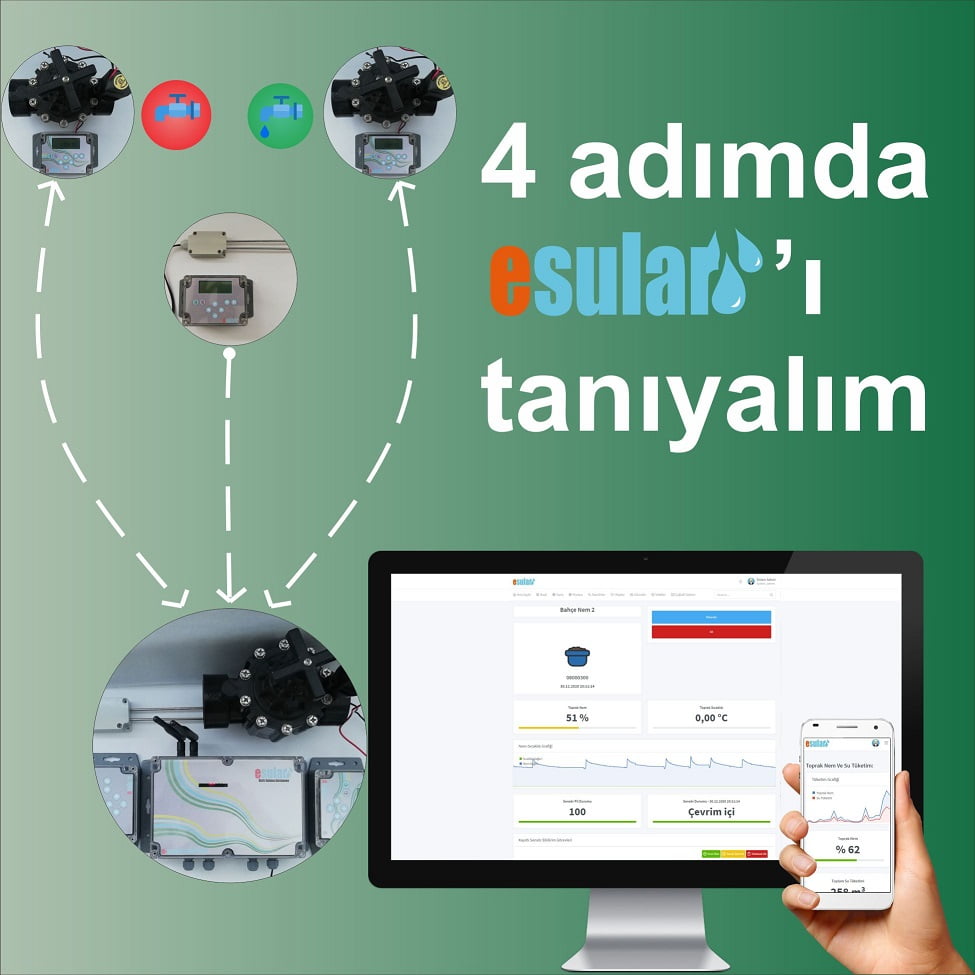
esular | Kablosuz Akıllı Otomatik Sulama Sistemi
Kablosuz otomatik sulama çözümleri ile sulama sistemlerinizi akıllı hale getiriyoruz
Digital Agriculture

Digital agriculture is the set of tools that digitally collects, stores, analyzes and transfers electronic data or information along the agricultural value chain to the end user. Data is sometimes collected with sensors and sometimes with new generation technologies such as satellites and drones. The collected data is interpreted by various algorithms and transferred to farmers via GSM, Wifi and Ethernet and remotely controlled IoT mobile applications. Farmers use this information to both increase their productivity and reduce input costs.

Digital Agriculture, Smart Agriculture to Achieve a More Sustainable World

According to UN calculations, there will be 9.7 billion people in the world by 2050, that is, approximately 2 billion more people compared to 2022. According to FAO, the UN food and agriculture agency, a 70 percent increase in agricultural production is required to meet this increase. This is not the only difficulty. Climate change is an increasing threat to agriculture as we see more erratic weather-related precipitation patterns and more frequent floods and droughts. Additionally, our current methods of food production contribute to a quarter of global greenhouse gas emissions, making climate change worse.
Agriculture also has a significant impact on the environment, as it consumes large amounts of valuable natural resources such as fresh water, which is rapidly depleting. Also, we cannot expand cultivated land to increase food production without causing further deforestation.
For our future generations, agriculture, our valuable resources, and food security are becoming more environmentally, economically and socially sustainable through the application of technology, digital and innovation.
Digital Agricultural Technologies
Among the technologies that are revolutionizing today and that will define the future of agriculture, the most remarkable ones

Data collecting
With the use of IoT technologies in agriculture, important data can be collected on weather conditions, soil moisture content, soil quality, crop growth rate.

Risk Analysis
The use of digital agricultural technologies allows possible problems to be prevented in advance. After making sense of the collected data in artificial intelligence-based systems, it is ensured that the crops are minimally affected by possible risks.

Process Automation
With the use of smart devices, many processes such as irrigation and fertilization in the production cycle are automated.
Benefits of Digital Farming
The application of digital farming technologies has a positive effect on agriculture and crop cultivation. Some of these improvements

Production Increase
Optimization of all agricultural processes increases production rates.

Saving Water
Weather forecasts and sensors that measure soil moisture mean watering only when needed and for the right amount of time.

Better Quality
Analysis of the quality of the product obtained in relation to the strategies applied enables adjustments to improve the quality of subsequent production.

Reduced Costs
Irrigation, fertilization, electricity, labor etc. in agriculture. reduces costs.

Better Sustainability
To save resources such as irrigation water and to provide maximum benefit from the land. It reduces the negative impact on the environment.
Esular's Contribution to Digital Agriculture
We provide up to 30% less irrigation with soil moisture measurement in summer months when water consumption is high, and up to 50% less in winter months.

What We Do
- Wireless and battery powered automatic irrigation.
- Multi-point partial irrigation.
- Predictive irrigation with soil moisture and different sensors.
- Metering controlled irrigation with water meter.
- Remote controlled IoT irrigation solutions with GSM, Wifi and Ethernet.
- Predictive irrigation solutions according to seasonal conditions.
- Hardware and software production.
Thanks to these digital technologies we use;
- We provide up to 30% less irrigation with soil moisture measurement in summer months when water consumption is high, and up to 50% less in winter months.
- We save up to 50% in energy consumption.
- With remote control and seasonal optimization, we can automatically delay irrigation and reduce irrigation intensity according to meteorological data and precipitation status information.
- Since we work fully automatically, it greatly reduces human intervention. It increases performance.

